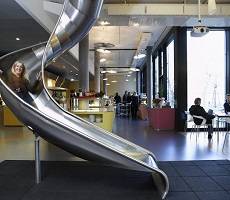June 9, 2014
Workplace Strategy Summit starts this morning with stellar line up of speakers and topics
 The world’s foremost workplace conference kicks off this morning and Insight will be there to cover all of it. . Speakers include Franklin Becker, Frank Duffy, Alexi Marmot, Wim Pullen, Ian Ellison, Ziona Strelitz, Andrew Laing, Chris Kane and Simon Allford will address the most important and up to date issues relating to workplace strategy. To coincide with the event, the latest issue of Work&Place will be published before being issued to around 25,000 IFMA members worldwide and made available free online to everybody. The event builds on the success of the first Workplace Strategy Summit held at Cornell University. Updates will be available on Twitter.
The world’s foremost workplace conference kicks off this morning and Insight will be there to cover all of it. . Speakers include Franklin Becker, Frank Duffy, Alexi Marmot, Wim Pullen, Ian Ellison, Ziona Strelitz, Andrew Laing, Chris Kane and Simon Allford will address the most important and up to date issues relating to workplace strategy. To coincide with the event, the latest issue of Work&Place will be published before being issued to around 25,000 IFMA members worldwide and made available free online to everybody. The event builds on the success of the first Workplace Strategy Summit held at Cornell University. Updates will be available on Twitter. #IFMAsummit14























May 27, 2014
A third of UK workers would welcome a digital assistant to free up their time
by Mark Eltringham • Comment, News, Technology
A vision of the present. © Pixar Studios
In the 2008 Pixar film WALL-E, humans have fled the planet they have destroyed in an orgy of garbage-generating mass-consumerism and been reduced to morbidly obese, sedentary lumps living vicariously through screens and whose every need is catered for by the machines around them. Well, they say the best science fiction is really about the present day and sure enough, it appears that many of us are perfectly happy with the idea of suckling at the galvanised teat of a robot overlord. A new survey carried out by ClickSoftware claims that a third of UK employees would welcome the idea of having a personal digital assistant to help them carry out everyday tasks. Over half (58 percent) hope that intelligent apps will take on at least a tenth of their workload in the future, especially those tasks considered mundane and repetitive such as administration, work scheduling and planning journeys.
(more…)